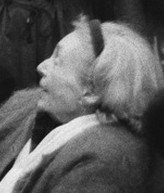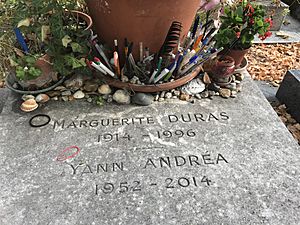Marguerite Duras facts for kids
Quick facts for kids
Marguerite Duras
|
|
|---|---|

Duras in 1993
|
|
| Born | Marguerite Donnadieu 4 April 1914 Gia Định, Cochinchina, French Indochina (present-day Ho Chi Minh City, Vietnam) |
| Died | 3 March 1996 (aged 81) Paris, France |
| Occupation | |
| Nationality | French |
| Education | Lycée Chasseloup Laubat, Saigon |
| Alma mater | University of Paris |
| Period | 1943–1995 |
| Spouses |
|
Marguerite Germaine Marie Donnadieu ( 4 April 1914 – 3 March 1996), known as Marguerite Duras, was a French novelist, playwright, screenwriter, essayist, and experimental filmmaker. Her script for the film Hiroshima mon amour (1959) earned her a nomination for Best Original Screenplay at the Academy Awards.
Early life and education
Duras was born Marguerite Donnadieu on 4 April 1914, in Gia Định, Cochinchina, French Indochina (now Vietnam). Her parents, Marie (née Legrand, 1877–1956) and Henri Donnadieu (1872–1921), were teachers from France who likely had met at Gia Định High School. They both had previous marriages. Marguerite had two older brothers: Pierre, the elder, and Paul.
Duras' father fell ill and he returned to France, where he died in 1921. Between 1922 and 1924, the family lived in France while her mother was on administrative leave. They then moved back to French Indochina when she was posted to Phnom Penh followed by Vĩnh Long and Sa Đéc. The family struggled financially, and her mother made a bad investment in an isolated property and area of rice farmland in Prey Nob, a story which was fictionalized in Un barrage contre le Pacifique (The Sea Wall).
In 1931, when she was 17, Duras and her family moved to France where she successfully passed the first part of the baccalaureate with the choice of Vietnamese as a foreign language, as she spoke it fluently. Duras returned to Saigon in late 1932 where her mother found a teaching post. There, Marguerite continued her education at the Lycée Chasseloup-Laubat and completed the second part of the baccalaureate, specializing in philosophy.
In autumn 1933, Duras moved to Paris, graduating with a degree in public law in 1936. At the same time, she took classes in mathematics. She continued her education, earning a diplôme d'études supérieures (DES) in public law and, later, in political economy. After finishing her studies in 1937, she found employment with the French government at the Ministry of the Colonies. In 1939, she married the writer Robert Antelme, whom she had met during her studies.
During World War II, from 1942 to 1944, Duras worked for the Vichy government in an office that allocated paper quotas to publishers and in the process operated a de facto book-censorship system. She also became an active member of the PCF (the French Communist Party) and a member of the French Resistance as a part of a small group that also included François Mitterrand, who later became President of France and remained a lifelong friend of hers. Duras' husband, Antelme, was deported to Buchenwald in 1944 for his involvement in the Resistance, and barely survived the experience (weighing on his release, according to Duras, just 38 kg, or 84 pounds). She nursed him back to health, but they divorced once he recovered.
In 1943, when publishing her first novel, she began to use the surname Duras, after the town that her father came from, Duras, Lot-et-Garonne.
In 1950, her mother returned to France from Indochina, wealthy from property investments and from the boarding school she had run.
Career
Duras was the author of many novels, plays, films, interviews, essays, and works of short fiction, including her best-selling, highly fictionalized autobiographical work L'Amant (1984). It won the Prix Goncourt in 1984. Duras's novel The Sea Wall was first adapted into the 1958 film This Angry Age by René Clément, and again in 2008 by Cambodian director Rithy Panh as The Sea Wall.
Other major works include Moderato Cantabile (1958), which was the basis of the 1960 film Seven Days... Seven Nights; Le Ravissement de Lol V. Stein (1964); and her play India Song, which Duras herself later directed as a film in 1975. She was also the screenwriter of the 1959 French film Hiroshima mon amour, which was directed by Alain Resnais. Duras's early novels were fairly conventional in form, and were criticized for their "romanticism" by fellow writer Raymond Queneau; however, with Moderato Cantabile, she became more experimental, paring down her texts to give ever-increasing importance to what was not said. She was associated with the nouveau roman French literary movement, although she did not belong definitively to any one group. She was noted for her command of dialogue.
Towards the end of her life, Duras published a short, 54-page autobiographical book as a goodbye to her readers and family. Duras died at her home in Paris on 3 March 1996, aged 81.
Awards and honors
- Prix de Mai 1958 for Moderato cantabile.
- Prix de la Tribune de Paris 1962 for L'Après-midi de Monsieur Andesmas.
- Sélection à la Mostra de Venise 1972 for the film Nathalie Granger.
- Prix de l'Association française des cinémas d'art et d'essai 1975 for India Song.
- Prix Jean-Cocteau 1976 for the film Des journées entières dans les arbres.
- Grand prix du théâtre de l'Académie française 1983.
- Prix Goncourt 1984 for L'Amant.
- Prix Ritz-Paris-Hemingway for L'Amant
Filmography
Director
- La Musica (1967)
- Détruire, dit-elle (1969)
- Jaune le soleil (1972)
- Nathalie Granger (1972)
- La Femme du Gange (1974)
- India Song (1975)
- Son nom de Venise dans Calcutta désert (1976)
- Des journées entières dans les arbres (1976)
- Le Camion (1977)
- Baxter, Vera Baxter (1977)
- Les Mains négatives (1978)
- Césarée (1978)
- Le Navire Night (1979)
- Aurelia Steiner (Melbourne) (1979)
- Aurélia Steiner (Vancouver) (1979)
- Agatha et les lectures illimitées (1981)
- L'Homme atlantique (1981)
- Il dialogo di Roma (1982)
- Les Enfants (1985)
Actor
- India Song (1975) – (voice)
- The Lorry (1977) – Elle
- Baxter, Vera Baxter (1977) – Narrator (voice, uncredited)
- Le Navire Night (1979) – (voice)
- Aurélia Steiner (Vancouver) (1979) – Narrator (voice)
- Agatha et les Lectures illimitées (1981) – (voice)
- Les Enfants (1985) – Narration (voice, uncredited) (final film role)
See also
 In Spanish: Marguerite Duras para niños
In Spanish: Marguerite Duras para niños


